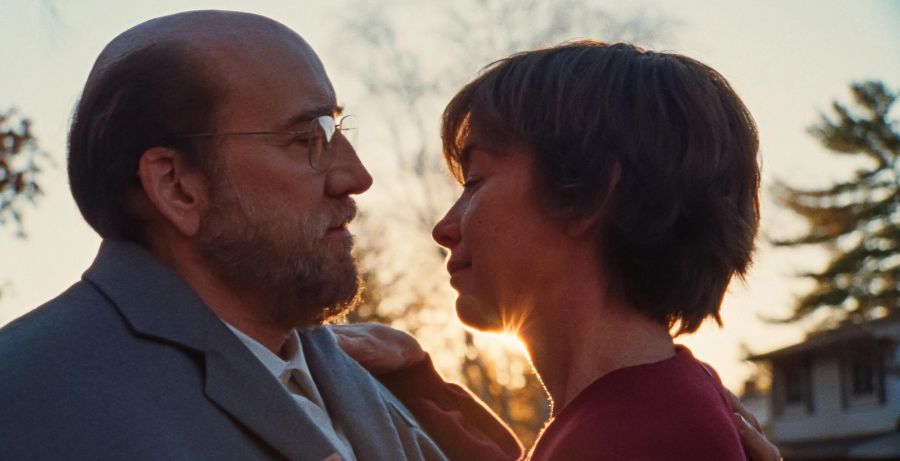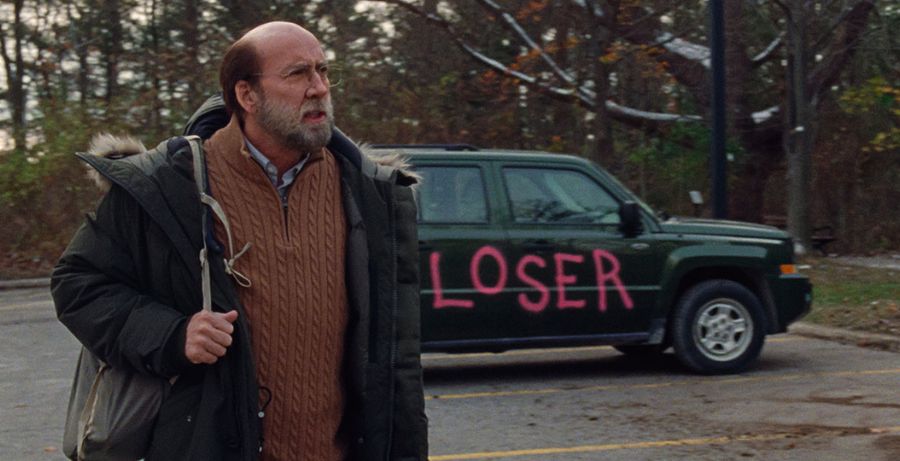In a career of countless credits, the word that first comes to mind when discussing Nicolas Cage’s filmography is “weird.” It’s an output that is as diverse as it is eclectic, with his greatest—and strangest—roles often coming immediately after some of his worst. Yet recently, his output has entered a period of stagnation, with filmmakers repeatedly stressing the same outlandish, exaggerated beats his acting style first became famous for. Though just as his work was becoming more forgettable, in comes the mind-bogglingly hilarious Dream Scenario to capture that magic all over again.
Kristoffer Borgli’s sophomore effort is, without a doubt, the most original and inventive film of the year. Channeling the surreal touch of Charlie Kaufman and Ari Aster (who serves as a producer), Borgli creates a memorable meta-physical commentary on virality and unwanted celebrity, cleverly filtering it through internet influencer culture and “memology”. But above all, it boasts a possible career-best Cage performance that doesn’t rely on his patented brand of outrage, instead investing in a timid, mild-mannered approach that is no less enduring and gut-busting.
Cage plays a character that most wouldn’t notice in front of their eyes, let alone their peripheries: Paul Matthews. A soft-spoken, unassertive shlub whose balding head and rumpled pants recall just about every sweater-vested professor working today. He’s the epitome of forgettable, droning on about evolutionary biology when he’s not frustrated and anxious over his academic anonymity.
Yet something strange happens: he starts appearing in other people’s dreams at an alarming rate. Either standing around or gingerly strolling through, launching him into the spotlight overnight. With such unprecedented fame, Paul is faced with an alarming number of decisions, and his dream to publish his long-gestating novel is met with competing agendas.
The plot description easily lends itself to a number of competing genres, but Borgli takes an all-encompassing approach. Equal parts cringe comedy, freakish fable, and social horror, Dream Scenario balances the three approaches deftly, often feverishly blending them all in single scenes to an uproarious effect. Borgli doesn’t differentiate dreams from reality, keeping audiences on their toes as they discern whether a given scene is real or imagined—forcing us to ponder whether our dreams are a reflection of reality or vice versa.

In a crafty move, the cause of the phenomenon is also never explained, giving Borgli the space to concoct vivid, hysterical moments that feature Paul merely trudging through his student’s dreams, blankly staring as they get mauled by killers and crocodiles. Like the people of Borgli’s vision, the audience is also made to blindly accept the madness and, like Paul, question what it all means and what we’d do with that level of fame.
Yet In Dream Scenario, the waking world often seems odder than the uncanny dreamscapes. A comical, polite rudeness permeates each conversation, especially as corporations attempt to commercialize Paul’s life—hilariously pitching him as the world’s first dream influencer in an uncomfortably long, awkward meeting. It’s a type of fame that begins to redefine his identity the more he rebels against it, with his desire to become a published academic continually being pushed to the sidelines.
In these moments, Dream Scenario reveals itself as a biting satire of modernity, mining the hilarity and perils of internet celebrity. The film then morphs into a clever take on cancel culture when the dreams become more violent, featuring the unassuming Paul as a vile, monstrous perpetrator in some wickedly absurd vignettes. His celebrity quickly turns toxic, disrupting his home life and turning him into a pariah who is shunned from college, his daughter’s recital, and even a local restaurant.
Armed with a great chuckle, Cage’s performance is less The Wicker Man and more evocative of his stellar work in Adaptation. It’s a role that commands range, shifting from a sympathetic meekness in reality to cartoonish psychopathy in everyone’s dreams.
It’s a turn that is key to the film’s staying power, emitting a forcefield that betters everyone around him. Cage is also at his most emotionally vulnerable, especially in an unforgettable scene where a young woman admits to having intense erotic dreams and has him reenact one of them together, culminating in one of the greatest fart jokes ever.
Though Dream Scenario is not without its foibles, Borgli’s lens has a lot to say about modern social tendencies but is not able to do complete justice to all of them, sometimes grazing powerful ideas but not fully clutching them on the route to its less-than-fulfilling conclusion—one that digs a hole it struggles to get out of. Nonetheless, Borgli’s second outing is an indelibly creative venture that will only get better with time, primed to be a cult classic as the world continues to be terminally online.
Dream Scenario screened as part of the 2023 Toronto International Film Festival.
Dream Scenario
-
Rating - 8.5/108.5/10
Summary
Though Dream Scenario is not without its foibles, Borgli’s lens has a lot to say about modern social tendencies but is not able to do complete justice to all of them, sometimes grazing powerful ideas but not fully clutching them on the route to its less-than-fulfilling conclusion…Nonetheless, Borgli’s second outing is an indelibly creative venture that will only get better with time, primed to be a cult classic as the world continues to be terminally online.







